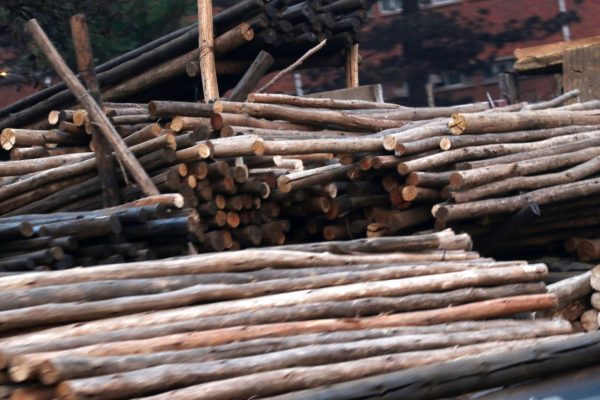
Magaba Siyaso is a home industry in Mbare, which is a popular one-stop-shop for hardware and other home appliances, mostly second hand, in Harare.
By Kennedy Nyavaya
It is a hive of activity just like the nearby Mbare Musika, which is home to fresh farm produce.
Magaba Siyaso, which accommodates metal and plastic suppliers, has in the recent past witnessed a significant increase in timber business.
Investigations established that while the commodity is in great demand, its market prices do not match the natural resource’s importance and value to humans and the environment in general.
Most of the timber is taken from gum trees (Eucalyptus camaldulensis), which take about 10 years to mature yet when “untreated” it is sold for as little as $1 to $2,50 per metre, depending on the diameter.
As the population grows, so has the need for shelter and this has made the business thrive, but what are the negative implications of depleting the eucalyptus plant from the environment?
“Eucalyptus is particularly good at sequestering carbon,” reads an online report of the exotic tree.
- Chamisa under fire over US$120K donation
- Mavhunga puts DeMbare into Chibuku quarterfinals
- Pension funds bet on Cabora Bassa oilfields
- Councils defy govt fire tender directive
Keep Reading
“Its wood is very dense, which means it holds more carbon for each cubic inch of wood and it grows fast, which means it takes up carbon quickly.”
Gum trees also grow large, meaning they store more of the toxic gases in the trunk and branches and root system.
The world is currently battling a disastrous series enigmas propounded mostly by carbon gas emissions which are causing global warming.
With this backdrop, protecting vegetation has become less of a choice, but a global priority yet locally the sprouting of urban settlements is fast threatening to replace the plants with houses.
Natural desertification, as a result of less water both underground and depleting atmospheric moisture, adds on to the climatic alteration disaster and there is urgent need to ensure safeguarding of such fast-growing resilient plants like eucalyptus.
A representative from the Forestry Commission told The Standard Style that they are pushing for the enactment of a Statutory Instrument (SI) on Plantation Forestry.
Apparently the Forest (Control of Exotic Timber Plantation Establishment, Management, Harvesting, Re-Establishment and trade in exotic timber) regulations 2015 could take more than the two years it has to be passed into law.
“We are in the process of making sure an SI which is still in draft form is passed into an Act,” said Forestry Commission spokesperson Violet Makoto.
“Basically, what it will be looking at is how to regulate registration of these forestry plantations and management, even to the extent of where the timber is marketed.”
This is in line with the parastatal’s vision to “be a world-class leader in the sustainable management and utilisation of forest resources in Zimbabwe.”
The commission’s mission states the need to support national socio-economic development through effective regulation and capacity enhancement in the sustainable utilisation and management of forest resources.
However, according to Makoto, although the Forestry Act has been helpful there hasn’t been proper coordination on the suppliers’ part in the industry, hence the reason why the SI is necessary.
It is uncertain whether all small-scale traders are registered and if they are, which authority is licensing this quick rise, but something does not seem right.
With transport, rentals and other utility cost factored in why is timber still that cheap?
Timbers Producers Federation (TPF) CEO Darlington Duwa insists there is sufficient timber in Manicaland’s Nyanga and Mutare plantation areas, but said there was need to enforce some changes for the business to fully benefit the sector.
“We need to do certain things in order to revamp the timber industry in the country, like making sure continued planting of trees in the plantations for the future,” he said.
He also said formalisation and recapitalisation was crucial for the formal business to thrive.
“We have to make sure that veld fires are stopped and that people illegally settled and practising agriculture on plantations are removed.”
Efforts to get a comment from the Ministry of Climate and Water just like the Environmental Management Agency were fruitless as questions sent were not responded to up to the time of going to print.
The rapid cutting of trees is bound to have negative effects on the efforts to mitigate or adapt to climate change, which is already destroying the environment.
Meanwhile, the monitoring of vegetation in Zimbabwe appears to be a bit too relaxed as firewood from indigenous trees is being illegally sold in most parts of the country.
Recent reports by our sister paper The Zimbabwe Independent also attested to the fact that the administration of the afforestation fund introduced in 2015 to replenish woodlots decimated by tobacco farmers hasn’t done much.
This means that damaged vegetation is not being replaced and the repercussions may not be too far in future.
However, as we enter a world of increasing climate change, there is need to understand the value of carbon storage and the most effective way is through trees which capture carbon dioxide from the atmosphere, and store it in their wood, roots and leaves as well as the soil beneath them.
In addition, trees, apart from providing oxygen, are a natural habitat for some living organisms and that makes them a huge part of the ecosystem.
Eucalyptus specifically plays an integral role for living organisms as it has nectar-rich winter-blooming flowers and this means that it serves as a food source to insects and birds which are also components of the greater food chain.











